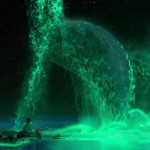It’s not very common to find a film that is as grounded as it is imaginative. Something that familiarizes us as much with reality and life at its rawest as it does with the wildest possible sides of our dreams and imaginations. Ang Lee is another director with great versatility, almost matching the standard of Steven Spielberg, but Life of Pi, which is based on a Canadian novel of the same name, is arguably his most authentic work to date.
Lee, despite his versatility, has managed to have a distinct style of direction, but in Life of Pi, even that feels nuanced to a fair degree. This is the best visual storytelling that we’ve ever seen from him, and despite the film being more of a survival drama than a mystery thriller, the way it uses suspense is very Hitchcockian in its own authentic ways.
How to Stream or Download Life of Pi
To stream or to download Life of Pi, click on the Download button that is located below this review. Then proceed to a digital store of your choice.
The Movie Review
The movie begins with Pi Patel narrating his story to a writer in London, who’s informed of the story’s power by others, upon searching for a real story to write a book on. Pi Patel is an interesting character not only due to the predicaments he’s in but also due to having the right kind of backstory.
He’s named Pisciline Patel by his secular father, but to avoid having his name compared with the word ‘piss’, he starts going by Pi, like the mathematical symbol. His family is mainly Hindu, but he explores different religions to get closer to God and arrives at the conclusion that he loves God regardless of the faith attributed.
He already happens to share an inwardly explorative nature, which makes the outwardly explorative situation that he gets into later on so compatible with the nature of his character. David Magee’s script has the kind of pacing and dialogue that really support the film too.
Pi’s family owns a zoo, and when he turns 16, they decide to move to Canada alongside the animals, all of which his father intends to sell. They travel on a Freighter towards Canada, and suddenly a storm comes forth, during which the ship owners throw him into a lifeboat, followed by the sinking of the ship, as well as the death of his parents.
On the lifeboat, there happens to be a zebra, an orangutan, a hyena, and a Bengal tiger named Richard Parker. Pi is threatened by the hyena, who later kills the orangutan and the zebra, and then out comes Richard Parker to kill the hyena. From there on out, the two of them are the only survivors on the boat. It all follows with sequences of Pi surviving the killer instincts of the tiger, as well as diving into his inner metaphorical worlds.
The best part, however, is the story Pi tells to the Japanese freighter company, and the way it philosophically fits the film’s nature. It’s something that should not be spoiled in a review. The end of Pi’s meeting with the writer is a cherry-on-top conversation too. It’s easily one of the most well-written films of the last decade, despite not being ultimately authentic.
Alongside being very well-written and well-directed, Life of Pi is also incredibly beautiful to look at and listen to. It tells much more with visuals and sound than a lot of movies do with heaps of dialogue. Claudio Miranda hasn’t had any other prominent showings as a cinematographer, but this is easily his magnum opus. Mychael Danna’s original score complements the culture of the film extremely well too. Both Suraj Sharma and Irrfan Khan are excellent at playing Pi at two different ages too.
All around, Life of Pi is another near-masterpiece from Ang Lee, and this time not only in terms of narrative and direction but also in terms of sound and sight. It’s not even the best film of its year, but it’s a cinematic achievement in its own ways. If one ever asks for a film that’s equal parts suspense and equal parts philosophy, Life of Pi would definitely be among the recommendations.


















